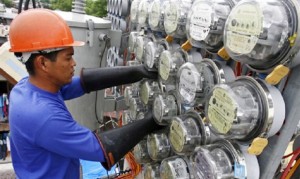Power users in for confusion
MANILA, Philippines—Consumers may be in for a confusing period as regulators and market players determine what constitutes collusion and just how much impact it has on electricity rates.
The power suppliers’ alleged timing of plant outages to influence prices likely had only a “minimal” impact, if any, on the looming increase in electricity prices for customers of the Manila Electric Co. (Meralco), according to Energy Secretary Jericho Petilla.
The Department of Energy is looking into power suppliers’ activities during the maintenance shutdown of the Malampaya natural gas facility while the Energy Regulatory Commission (ERC) will determine what sanctions may be imposed on price-fixing violators, if any, said Petilla in text message.
Price fixing
Asked how much of the looming P4.15/kwh increase in power generation and related charges could have been influenced by the alleged price fixing, Petilla said he did not have the computation on hand.
“However, let us be clear. The main component of the increase in Meralco prices is not WESM (the Wholesale Electricity Spot Market). WESM is usually only 10 percent of the generation cost of distribution utilities,” he said.
Petilla said the DOE has yet to summon the power generators to explain allegations of collusion.
“We have to analyze first the behavior of the market in the past four weeks and will ask them to explain depending on our findings,” he said.
“The ERC will have to penalize for market abuse if this is proven,” he added.
‘Confluence of factors’
Meralco has blamed the significant spike in the generation charge on “a confluence of factors,” mainly the Malampaya maintenance shutdown and the shutdown of other power plants either for regular maintenance or forced outages, making the distribution utility dependent on the WESM, where there was in turn a spike in prices because of the surge in demand.
At a recent ERC briefing, however, Meralco officials said electricity from suppliers trading in the WESM accounted for about 11 to 12 percent of the power that Meralco tapped in the supply month of November (to be reflected in electricity bills this month) while bilateral contracts with private power suppliers, including independent power producers (IPPs), accounted for about 50 percent.
The rest were from other supply agreements, such as the one with the Aboitiz Power Corp. subsidiary, Therma Mobile Inc., for peaking requirements.
The allegation of collusion was floated at a recent hearing at the House of Representatives, in which energy undersecretary Raul Aguilos said that Meralco was supposed to have charged only an additional P1.58 per kwh to accommodate the Malampaya shutdown.
Aguilos said the DOE was surprised the rate hike “spiked” to P4.15 per kwh, or nearly three times what the government had anticipated when several power plants they expected to take up the slack for the Malampaya shortfall were shut down during the period.
Meralco officials had told Congress and the ERC that the use of liquid fuel accounts for an estimated P1.04/kwh of the P4.15/kwh blended increase (power generation, taxes and other charges) in pass-through power charges.
Scheduled shutdown
The impact from spot market prices in the WESM was estimated at P2.38/kwh.
The scheduled shutdown of the Malampaya pipeline forced three power-generation plants using natural gas to use more expensive fuel in order to keep on supplying energy to Meralco. The three are the natural gas power plants in Sta. Rita, San Lorenzo and Ilijan, all in Batangas province.
The Malampaya gas facility shuts down for maintenance about once every three years (2007, 2010, 2013), affecting the three plants for a total of 2,700MW. In each of those years, Meralco had requested the Lopez-led First Gen Corp. to run on liquid fuel.
Not yet full capacity
First Gen said the decision was based on Meralco’s so-called “least cost methodology” where they line up all available suppliers (hydro, coal, geothermal, oil, and so on) starting from the cheapest. This process is said to limit Meralco’s exposure to high prices in the WESM.
On allegations floated at the congressional hearing that Therma Mobile did not sell its full capacity to Meralco in order to influence spot market prices, Aboitiz Power SVP for power marketing and trading Luis Miguel Aboitiz clarified that Therma Mobile was in fact not yet at full capacity.
“Therma Mobile only has 100MW. The balance of 130MW will only be available in mid-2014,” said Aboitiz, who leads the Philippine Independent Power Producers Association, Inc.
“Meralco contracted Therma Mobile so it is the one that influences dispatch and offer pricing,” he said.
Meralco itself has not raised allegations of collusion or price fixing among its power suppliers. Company chair Manuel V. Pangilinan told reporters: “We don’t know that. We haven’t indicated that on our side.”
Aboitiz and other power industry leaders said the Philippine Electricity Market Corp. (PEMC), which operates the WESM, would be in the best position to shed light on allegations of collusion and price fixing.
The PEMC, as the WESM operator, would have the data on plant outages and their effect on prices, said Aboitiz.
